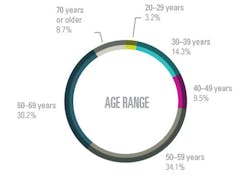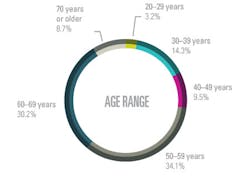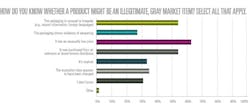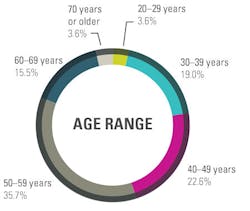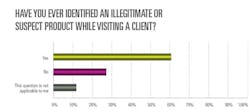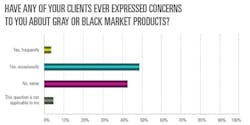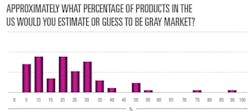AUDIENCE FORUM
We could have just guessed that the gray market is something you've heard about. If you're a dentist, maybe you've talked to a sales rep or two about it. If you're a rep, a consultant, or another type of industry professional, maybe you've discussed it with a client. but the fact is that knowledge about the gray market can be as murky as many backroom players.
what do you know about the gray market?
what do your colleagues know about it?
how big is the problem . . . or is it a problem at all?
Editor's note: The views and opinions expressed in this article are those of anonymous survey respondents and do not necessarily reflect the opinions of Apex360 or PennWell Corporation.
Wherever you are in the industry, we thought you might want to know the answers to these questions. So, we surveyed 126 dentists and 84 industry professionals (sales reps, consultants, marketing professionals, etc.) and asked them for their input. We invited everyone who took our surveys to share comments, opinions, and questions. Of our 210 anonymous respondents, 32 dentists and 35 industry professionals chimed in and shared.
Here's what they had to say.
Dental Professional Survey
WHAT DENTISTS SAY
"[I'm] concerned about a lot of dental distributors that I never heard of. [I] saw booths at [the] Yankee dental conference, especially [for] dental instruments. Are they legal? What metals are used? I could not trust them, but prices were cheap."
"Where can a dentist find out if a vendor is selling gray market items? They do not advertise the fact."
"I have used some gray market handpieces, and they are fabulous . . . not just for the price but for the quality of the handpiece. I purchased [them] on eBay from China."
"It is not ethical to treat patients with gray market material!"
"It is becoming increasingly difficult to manage overhead; supplies and equipment costs are a significant part of the overhead. It is not surprising a gray market is emerging, and I am sure, increasing significantly. Thank you, dental insurance companies."
"[The issue] needs more publicity."
"Markups for identical items sold in [the] US versus [the] overseas market are obscene. [A bonding agent] marked for sale in India sells on [the] Internet for about one-third to one-quarter of [the] US sales price. My neighbor just went to the Philippines and had five CAD/CAM crowns done for $500. My lab bill would far exceed that."
"Manufacturers should sell products in [the] US for [the] same price they do overseas, and that would stop [the] gray market."
"Higher costs get passed on. Without [the] gray [market], manufacturers would be bolder and raise prices even more aggressively."
"I had no idea that gray market items were such a concern. Thank you for bringing it to my attention."
"Two things: If the product is a legitimate product of a US manufacturer that comes from outside the United States, is not past the expiration date, and is sold for a lower price, I don't see any harm to patients. If the item is past the expiration date, a 'knockoff,' coming from overseas and [has] questionable origins, I think there is the potential for harm to patients, and [it] should not be allowed."
"Greed, insurance reimbursement cuts, [and] high overhead contribute to dentists looking for the best deal. The sole proprietor is struggling to survive. The dirty secret none of the pundits wish to discuss is [the] profit margins of dental suppliers because their sponsors are [major distributors]-as bad as pharmaceutical companies."
"The manufacturers do nothing about this, nor do they publicize it; they are part of the problem."
"The gray market products industry is driven by the poor economy and the ever-increasing price of goods from dental distributors. No matter what happens with dental practices' cash flows, dental distributors raise their prices every year, even during recessions. With insurance companies squeezing dentists and overhead rising, there is a strong incentive for practices to seek savings anywhere they can. The dental industry must realize they cannot charge whatever they want and expect that dentists will just pay it because they have to. Hopefully some company will realize the huge potential of a discount supplier that actually offers supplies at a real discount. Dentistry needs a [store like] Wal-Mart or Costco, and whoever introduces it will make a fortune."
"Interesting. One can easily find products that MIGHT be considered gray market since they are purchased from overseas suppliers or from a store like eBay. But [it's] hard to legitimize buying a product from a 'legit' dental company and then ordering, receiving, and comparing identical products (e.g., equipment) from an overseas supplier and paying 80% less for the same."
"People who do cut-rate dentistry and don't care about their patients would use this stuff. ObamaCare and HMO/PPO contracts are pushing dentists who sign up to go this way."
"Most people [who] go to the dentist shop at Costco. And they get low-cost goods from the gray market, and people are paying to shop at Costco. Service from authorized dealers [is] subpar at best."
"Gray market products may not meet US standards. Even if they do, they should not be sold in the US."
"Are all gray market products negative? It seems like some are made by European makers from major dental companies. Are they similar and repackaged?"
"I have shopped online for savings with smaller distributors. I never realized the products might not be legitimate."
"It can be difficult to determine the difference between a discount supply house and a gray market operation. Full-price, full-service operations can be so overpriced that any discount is appreciated and can encourage the pursuit of deals."
"I did not know that this gray market was a problem."
WHAT INDUSTRY PROFESSIONALS SAY
"Where is the government on this issue? Why have manufacturers failed to stop or penalize the resellers more forcefully? Some have, but more needs to be done!"
"With the access to many places to buy dental products on the web, I think this trend will continue to grow. It is difficult for [dental office] staff members to know if a business is legitimate or if it sells gray market products. They often look the same as legitimate US products."
"Doctors need to stop looking to save a buck by purchasing these products and use 'legal' products for their patients. Their patients deserve the best products or, at least, legit products to be used in their mouths. If something goes wrong, where do the patients or even the doctors turn? There doesn't seem to be much concern, which scares me. It's then time to look for another doctor to treat oral health issues."
"This is a very serious problem in the United States. I just hope and pray that something gets done at a higher level soon. I've always put it into perspective like this: 'Your child is having a medical procedure . . . What if your medical doctor was buying instruments, supplies, etc., from Amazon, eBay, online sources, small catalogs, or potentially unauthorized dealers? What if the procedure or outcomes didn't go as planned?'"
"I think most manufacturers do not do enough to help distribution combat [the issue] and educate our doctors on the pitfalls of using gray market merchandise."
"Manufacturers must be proactive in how they address gray market activities."
"The problem is that [companies] proliferate the access to the gray market without any repercussions. The products I have seen in the field have been the exact same products the doctors can get from local dealers. There [are] no repercussions to the doctors [who] are buying items that are clearly marked 'Rx' from local or federal agencies. The government wastes millions of dollars on useless and ineffective Sunshine Act reporting, while the gray market is slowly rendering the local sales professional economically obsolete and the value we bring irrelevant because the price difference is too large."
"The gray market is getting harder to identify. By all appearances, gray market products seem to be legitimate. It is getting harder to convince dental offices [of] the actual risks of [the] gray market. In order to eliminate [the] gray market, manufacturers and the industry must be vigilant to stop this. Mark my words: There will be an incident with a gray market product in a patient's mouth that will cause extreme harm. Eventually, there will be a lawsuit. I wish the dental industry would properly address this issue before it gets to this point."
"Manufacturers will typically not cover any dental/medical complications if [a] product results from a gray market purchase (assuming [the] dentist is sued for some type of product complication). Some offices think materials purchased through gray market avenues cannot be traced back to an authorized/unauthorized dealer. They are WRONG! We have monthly reports from our authorized dealers [about sales] of any product we make. We know if and what they purchase through authorized dealers. If our product is in an office, but no sales are reported in their account history, this could be a red flag to the manufacturer. Also, more education needs to be [offered] to the general public regarding gray market dental materials. It has grown tremendously over the years. How would you feel if you had filling material placed in your mouth that was sold out of some guy's house in your neighborhood? Sadly, that is how it is in some cases."
"When will the federal government step in and end gray market products? I guesstimate that over 50% of dentists have ordered and used gray market products in the past year."
"Dentists, as medical professionals responsible for the wellbeing of their patients, need to be aware that the savings they get from purchasing gray goods could compromise their livelihood if that material fails or inadvertently harms even one of their patients. With the existence of Yelp, Google, and multiple social media platforms, one patient feeling slighted or unsatisfied could lead to a torrent of 'bad press.' They shouldn't risk their reputations to save a relatively small amount . . . if the price is too good to be true, watch out!"
"I'm shocked at the number of dental providers (dentists, dental groups) who do NOT care about anything but price. Some even bury their heads in the sand with a 'don't ask, don't tell' mindset. It's a shame, frankly."
"I am disappointed in the lack of concern that most manufacturers have in addressing this issue to control or stop it."
"It has been my experience that doctors seek out gray market materials, despite the risks, to save some money."
"Doctors need to be better educated about the risks they are taking when purchasing from unauthorized dealers. Manufacturers need to distinguish their products better-those that are intended for the US and those that are not."
"With all of the pressure on privately owned practices to compete with corporate, large group, and newly opened private practices right across the street; employees wanting raises; rent going up; the rising costs of everything; and the insurance companies reimbursing less for the same procedures than last year, there is continued pressure to cut recurring costs. Unfortunately, not all companies are morally/ethically the same and doctors and their teams are caught as they 'shop' to save money, only to be scammed by less-than-honest deals. I wish there was a simple solution like 'buy from an authorized dealer' . . . but wait, that is the simple solution! Unfortunately, that's not always easy to decipher."
Industry Professionals Survey
'We need to talk'
Industry professionals chime in: How to determine when to educate clients about gray market products and what to say when the time comes
A conversation about gray market products can begin for a variety of reasons. Perhaps the dentist claims to have been using a particular product, but the visiting rep has no record of the sale. Or, perhaps the dentist remarks that a certain product isn't performing as expected, and upon seeing the box, the rep discovers that the product was manufactured for sale in Italy.
Regardless of what spurs the conversation, it can be challenging to navigate. Sales reps, consultants, and other industry professionals who took our survey told us how they educate their clients about gray market products and shared some anecdotes about their experiences as well as their suggestions on holding these conversations.
Here's what they had to say.
On identifying noncompliant products
A few readers offer their suggestions and strategies for identifying gray market products during visits to dental offices . . .
Examine the packaging closely:
"This is a very difficult conversation that can end a relationship with the doctor. Always verify details on packaging with the manufacturer, as identifying [gray market products] can be very difficult. My experience is that, even after [they're] educated, many dental professionals continue to buy the potentially dangerous materials and supplies from online and small book catalog sources."
Do your research:
"I may notice a product they didn't buy from my company and ask where they purchased [it] and why. I may be asking [them] to place an order based on their typical time/usage data and find they have already purchased [the item] elsewhere. The usual answers range from 'I got a good deal' or 'I couldn't pass up the special' to 'I need to cut my cost, and their prices are so much [lower].' If it is a name-brand product, depending on the source, I may explain that the company is not an authorized distributor, per the manufacturer's [online] list of authorized sellers. Sometimes I can even provide actual lawsuit letters, showing cease-and-desist selling orders. Some doctors/offices who do this are taken [aback] when they hear the news, but after they talk with their purchase sources, they choose to keep and sometimes continue to buy from these sources-basically conceding to the 'it's all about price' response. Others put a better value on the quality of care and service provided to the patients and do not ever want to be associated with a potential issue like gray or black market dental supplies."
"It generally starts with pricing that is way out of line-too low. Then I find out if [the product is from] an authorized dealer-usually not."
Check the point-of-sale data:
"When they claim [to be] using our products but do not appear in [point-of-sale] data, I begin questioning who they are purchasing from, and if it's a known gray market company and/or not a certified dealer, I begin the conversation."
Return the items to the manufacturer:
"I had an account try to return products purchased from me because the new doctor wanted to purchase them based on price. I asked what company, and it turned out to be a well-known gray market dealer. I took the opportunity to educate them about the gray market and the possible dangers [of using gray market products]. Their next shipment had products that were obviously gray market. I was able to work with the original manufacturer to get the products replaced [with authentic products], took the gray market products, and sent them to the manufacturer."
On starting the conversation
One respondent said that he or she prefers to take an approach that is "nonthreatening and conversational." Others provided examples and suggestions to that effect.
For instance, one respondent described how he or she initiates the conversation:
"I understand the price may be attractive; however, there are risks to using these products. They are called gray market. They are not illegal for you to use, but they are not sold by licensed distributors. What this means to you is . . . "
Another provided this perspective:
"The safety of the patient comes first. Then my reputation as a purveyor of quality dental products comes second. [The gray market] makes us legitimate dental distributors look like crooks. It is not good for dentistry."
Types of approaches
Many respondents noted that they use personal anecdotes and textual materials, such as infographics, articles, and research, to educate dentists on gray market products:
"I have a gray market handout I use [that explains] how a doctor went to jail and lost his license because a patient had a reaction to a gray market product."
"Dr. [Gordon] Christensen has an article pertaining to gray market products. I approach it from the liability aspect."
"I discuss personal experiences I have encountered over the years, such as allergic reactions to crowns (not made by my company) that were purchased from gray market dealers, as well as the story of an office where the lot number on the adhesive was not even in our system. I also share Dr. Christensen's article regarding gray market materials."
"I show them the letter Dentsply sent out, explaining why it is bad and [Dentsply's] efforts to fight against it."
Others explained how they focus on the dentist's risk of liability, the ethical implications, and the cost:
"I explain that the product should not be for sale in the United States, that the office cannot verify that is has been shipped or stored properly, that it may pose a risk to the practice, and that manufacturers won't stand behind products that are not purchased through authorized partners."
"I explain the liability of using those products on patients: No warranty, no recourse."
"I explain that the products may be counterfeit and that they are at risk if a problem arises."
"When the office's costs are well below authorized distributor costs and well below average selling prices in market, the conversations I have are based on factual purchase reports. I share recent court actions being taken by manufacturers against unauthorized distributors and discuss liability issues. I discuss examples: how there is uncertainty with the gray market, how products could be counterfeit, and what that means to patients and possibly the dentist's reputation. Buyer, beware: If the price seems to good to be true, understand your liabilities in today's legal environment."
"[I ask the doctor,] 'Can you replace that item after purchase, and do you know if the manufacturer will back it if something is wrong?'"
"[I explain how] it is unethical, how the products are not guaranteed, and that they pose a health risk to patients."
"[I tell clients that] gray market products have a high risk of being counterfeit, tampered [with], and/or expired. Although gray market is cheaper initially, it will cost [dentists] more in the long run."
"I inform them of authorized dealers and that if they purchase from an unauthorized dealer, they cannot be certain of the product's contents."
"I explain the risks and consequences of using these products on their patients as well as the legal implications. Sadly, some don't care."
"Most often these conversations start around pricing. Usually, I inform my clients that gray market products aren't eligible for manufacturers' free goods and that when those free goods are factored in, the net price is often lower than it would be through the gray market company. They almost always choose to purchase through an authorized distributor."
Editor's note: The views and opinions expressed in this article are those of anonymous survey respondents and do not necessarily reflect the opinions of Apex360 or PennWell Corporation.
